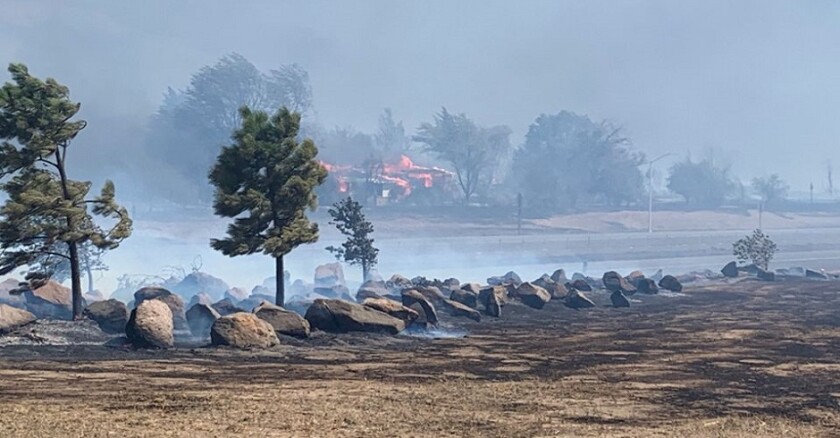On Wednesday, some of the more than 50 air quality monitoring stations scattered across the state show Woodburn, Corvallis, Eugene, Roseburg and Lincoln City blanketed with levels of smoke dangerous to everyone -- young and old, healthy or not.
Oregon’s emergency responders are well aware the skies are amber, orange or even red in some areas.
“Don’t call 911 to report smoke, there’s smoke everywhere and our 911 system is being inundated with smoke calls,” said Andrew Phelps, director of Oregon’s Office of Emergency Management, on Wednesday.
The Portland area so far has largely been spared the air quality problems plaguing some other parts of the state. With the exception of Monday, when particulate levels reached 'unhealthy" levels for everyone, Portland has measured mostly “good” or “moderate” levels of smoke this week. Some areas of the city, however, have registered air quality that’s “unhealthy to sensitive groups,” which includes people with asthma or heart and lung disease.
Type in your city or ZIP code at the U.S. Environmental Protection Agency’s air quality website, airnow.gov, to check the latest particulate levels where you live. Or view interactive maps at the state’s web page, oregonsmoke.blogspot.com, or the EPA’s web page, fire.airnow.gov.
Air particulate levels of zero to 50 is considered good, 50 to 100 moderate, 101 to 150 unhealthy for some groups, 151 to 200 unhealthy for everyone and 200 to 300 very unhealthy. Particulate levels in the hardest hit parts of the state were off the scale -- measuring more than 500.
Tiny smoke particles can embed themselves in the lungs, enter the bloodstream and affect the heart, according to the EPA. Larger particles can cause eye, nose and throat irritation.
The Washington State Department of Health says wildfire smoke can weaken immune systems and possibly increase a person’s susceptibility to COVID-19. Smoke also can make matters worse for those already battling the novel coronavirus, as they struggle to breathe. One study found that people who live in areas with heavy air pollution are more likely to die from the disease.
As areas around the state are currently inundated with putrid air, people who must venture outside are looking for ways to protect themselves from breathing in the particulate-filled air.
State environmental authorities are urging people with chronic illnesses, such as heart and lung disease, to stay in their homes and avoid prolonged exposure to wildfire smoke. They also recommend that small children and the elderly limit their exposure.
Here are some of the recommendations from the Oregon Health Authority:
If possible, stay inside, close windows or use air conditioners (if you have them) with the intake closed. Also, run a high efficiency particulate air filter (HEPA), or an electro-static precipitator (ESP).
If you do not have air conditioning and it is too hot to stay indoors with the windows closed, find a clean-air space in your community, such as a library, shopping mall or community center. If poor air quality continues overnight, you may need to book a hotel room, or stay with a friend who has air conditioning.
Don’t use anything that burns, like candles or gas stoves. And don’t smoke cigarettes indoors, which contributes to the already poor air quality.
Refrain from vacuuming or doing other activities that stir up dust.
Do not rely on masks for protection. Most non-medical grade masks won’t protect lungs from the fine particulates of wildfire smoke. Bandanas are equally ineffective.
Although respirators, like those labeled “NIOSH” and the rating of N95 or N100, can protect against smoke, they must be properly fitted by a trained professional, and are in scarce supply due to the coronavirus pandemic. Officials also have urged that these masks be reserved for medical and other frontline workers.
Ultimately, the agency recommends limiting exposure to smoky air as much as possible. For more information about effective masks, see the Respirator Fact Sheet provided by CDC’s National Institute for Occupational Safety and Health.
Avoid outdoor activities, especially exercise, when air quality is unhealthy and hazardous.
Asthma sufferers or those with other respiratory problems should follow their breathing management plans or talk to their doctors. Have an adequate supply of medication on hand (OHA recommends a five-day supply).
If you spend time in a vehicle, turn the air conditioning on recirculate.
-- Grant Butler; gbutler@oregonian.com; 503-221-8566; @grantbutler
-- Aimee Green; agreen@oregonian.com; @o_aimee
———
©2020 The Oregonian (Portland, Ore.)
Visit The Oregonian (Portland, Ore.) at www.oregonian.com
Distributed by Tribune Content Agency, LLC.








